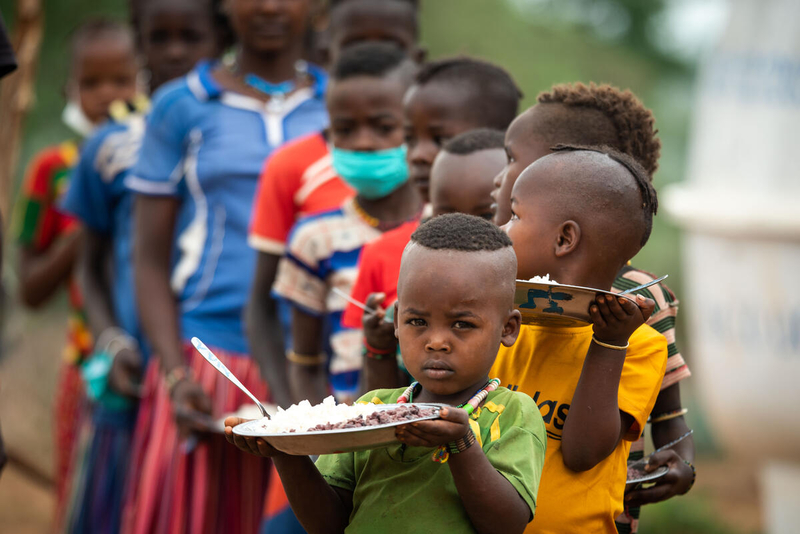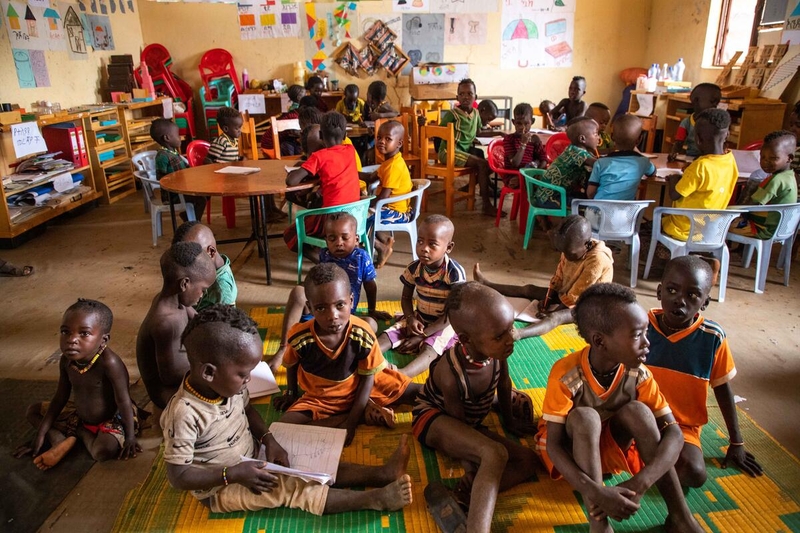
The WFP Centre of Excellence against Hunger Brazil welcomed the government of Ethiopia to the first session of the “Virtual Study Visit: Brazil”, which took place on Wednesday, May 4. A total of 73 participants from WFP Ethiopia, the Ethiopian government at the national and regional levels, as well as partners from Save the Children joined online. The government of Ethiopia is currently committed to transforming the country’s agriculture sector, namely its approaches to school feeding, through adequate policies and programmes. With a view to eliminate hunger and malnutrition, it expects to accelerate commercialization, establish stable networks for farmers and strengthen cooperatives.
Sharon Freitas, Head of Programme at the WFP Centre of Excellence, highlighted the importance of the Virtual Visit as a means to strengthen national capacities and promote knowledge sharing on school feeding and social protection via South-South Cooperation. The set of tools revolving around the Virtual Visit can facilitate dialogue, lower costs, and reinforce the relevance of truly homegrown school feeding programmes, as happens with the Brazilian case. “Besides attending the ultimate need of providing safe and nutritious meals for children, the model guarantees reliable markets for smallholder farmers, generating income and stimulating the local economy, ensuring more diverse and fresher products”, she said.
Ambassador Ruy Carlos Pereira, from the Brazilian Cooperation Agency (ABC), and Karine Santos, from the National Fund for Education Development (FNDE), welcomed the participants via video messages and stressed the significance of sharing knowledge with and developing capacities of partner countries, integrating public policies, and ensuring the benefits of school feeding.
School Feeding in Ethiopia
While most of the population directly relies on agriculture as a means of living, the persistence of food and nutrition insecurity remains a key challenge, affecting school attendance, children performance and their health, with girls assuming most of the burden.
With nearly 30 years of existence, the Ethiopian school feeding programme is increasing its scope and strategic focus, building on a pilot project that links school feeding with local agricultural production. More and more, various bodies of the federal and regional bureaucracies, city administrations, and communities are recognizing the importance of establishing a universal and sustainable school feeding programme.
As stated by the Ethiopian State Minister of Agriculture, Melese Mekonnen, in his opening remarks, the Virtual Visit will allow the country to strengthen ties with the Brazilian government and learn from its experiences and success stories to develop tailored interventions that can serve as a basis for a cost-effective national initiative.

Virtual Study Visit: Brazil
The first session of the Virtual Visit started with an overview of the state of school feeding in Ethiopia, led by Mekuanent Dagnew, from the Ministry of Education. He detailed how the Ethiopian school feeding programme was established in 1994, with the collaboration of the WFP, and covered 40 primary schools, being then scaled up to different parts of the country. More recently, different ministries and development partners, among them the WFP, were involved in the creation of a policy framework and a strategy aiming towards the effective implementation of a school feeding programme in the country.
The national school feeding policy framework, which set a vision of providing at least one meal a day to all pre-primary school children by 2030, is based on four pillars: at least one safe and nutritious in-school meal mainly from local purchases; strong institutional arrangements; sustainable and stable financial sources; and robust coordination mechanisms.
Alemtsehay Sergawi, from the Ministry of Agriculture, presented the success factors and challenges for a nutrition-sensitive agriculture in Ethiopia. She mentioned that apart from recent efforts, the country still deals with high levels of stunting, chronic insecurity, and malnutrition, which influence child mortality, school enrolment and poor performance in primary school. “Elimination of stunting is a necessary step for growth and transformation in Ethiopia”, she added, emphasizing the importance of linking school feeding with local food purchases, agroecological production and culture-based food recipes.
Amongst the main challenges, Alemtsehay Sergawi mentioned: weak institutional setup; poor infrastructure on post-harvest handling and insufficient value addition throughout the production chain from local production to schools; inadequate data management, nutrition finance, and technology adoption; as well as weak sectoral coordination, especially at the regional level.
Valmo Xavier, from FNDE, presented the main features of PNAE, its decentralized model involving federal government, states, and municipalities, and explained how the programme was adapted with school closures during the COVID-19 pandemic. He highlighted the role of the Ministry of Agriculture in providing training to smallholder farmers involved with school feeding.
All those taking part in the Virtual Visit received a package of documents on Brazil’s school feeding experience – books, policy-briefs, and technical manuals – together with detailed videos on all aspects of PNAE.
This first online meeting was facilitated by the WFP Centre of Excellence Brazil. A second encounter will take place on May 12, when participants will be able to pose questions, share experiences, and discuss with the Brazilian counterparts. The Virtual Visit will be followed by a face-to-face meeting in Brasília.
Learn more about the “Virtual Study Visit: Brazil” and request a virtual visit here.




